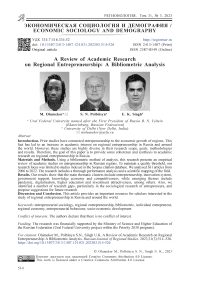A review of academic research on regional entrepreneurship: a bibliometric analysis
Автор: Olumekor M., Polbitsyn S.N., Singh U.K.
Журнал: Регионология @regionsar
Рубрика: Экономическая социология и демография
Статья в выпуске: 3 (124) т.31, 2023 года.
Бесплатный доступ
Introduction. Prior studies have connected entrepreneurship to the economic growth of regions. This fact has led to an increase in academic interest on regional entrepreneurship in Russia and around the world. However, these studies are highly diverse in their research scope, goals, methodologies and results. Therefore, the goal of this paper is to provide some coherence and synthesis to academic research on regional entrepreneurship in Russia. Materials and Methods. Using a bibliometric method of analysis, this research presents an empirical review of academic studies on entrepreneurship in Russian regions. To maintain a quality threshold, our research focus was limited to studies indexed in the Scopus citation database. We analysed 361 articles from 2006 to 2022. The research includes a thorough performance analysis and a scientific mapping of the field. Results. Our results show that the main thematic clusters include entrepreneurship, innovation system, government support, knowledge economy and competitiveness, while emerging themes include pandemic, digitalisation, higher education and investment attractiveness, among others. Also, we identified a number of research gaps, particularly in the sociological research of entrepreneurs, and propose suggestions for future research. Discussion and Conclusion. This article provides an important resource for scholars interested in the study of regional entrepreneurship in Russia and around the world.
Entrepreneurial sociology, regional entrepreneurship, bibliometric, individual entrepreneur, regional economy, entrepreneurial behaviour, socio-economic development
Короткий адрес: https://sciup.org/147241541
IDR: 147241541 | УДК: 334.7:316.334.52 | DOI: 10.15507/2413-1407.124.031.202303.514-526
Текст научной статьи A review of academic research on regional entrepreneurship: a bibliometric analysis
Conflict of interests. The authors declare that there is no conflict of interest .
Funding. The research was financially supported by the Ministry of Science and Higher Education of the Russian Federation (Ural Federal University project within the Priority 2030 program).

Контент доступен под лицензией Creative Commons Attribution 4.0 License.
This work is licensed under a Creative Commons Attribution 4.0 License.
Оригинальная статья
Обзор исследований по региональному предпринимательству: библиометрический анализ
М. Олумекор1 В , С. Н. Полбицын1, У. К. Сингх2
-
1 Уральский федеральный университет имени первого Президента России Б. Н. Ельцина ( г. Екатеринбург, Российская Федерация )
-
2 Делийский университет ( г. Нью-Дели, Индия )
Введение. Предыдущие исследования связывали развитие предпринимательства с экономическим ростом регионов. Понимание этого факта привело к росту академического интереса к исследованию регионального предпринимательства в России и во всем мире. Однако эти исследования весьма разнообразны по целям, применяемым методологиям и полученным результатам. Цель статьи ‒ на основе проведенного библиометрического анализа обеспечить согласованность и обобщение академических исследований по региональному предпринимательству в России.
Материалы и методы. Проведен эмпирический обзор академических публикаций по предпринимательству в российских регионах с использованием библиометрического анализа. Для обеспечения качества проведенного исследования наше внимание было ограничено работами, индексируемыми в базе данных цитирования Scopus. Проанализирована 361 статья с 2006 по 2022 г. В исследовании также применялись тщательный анализ производительности и научное картирование области.
Результаты исследования. Определено, что основные тематические кластеры включают следующие темы: предпринимательство, инновационная система, государственная поддержка, экономика знаний и конкурентоспособность; среди новых тем ученых интересуют пандемия, цифровизация, высшее образование и инвестиционная привлекательность. Выявлен ряд пробелов в научной литературе, особенно в социологических исследованиях предпринимателей. Предложены рекомендации для будущих исследований.
Обсуждение и заключение. Проведенное исследование и полученные результаты представляют собой важный академический ресурс для ученых, заинтересованных в изучении регионального предпринимательства в России и во всем мире.
Конфликт интересов. Авторы заявляют об отсутствии конфликта интересов .
Финансирование. Исследование выполнено при финансовой поддержке Министерства науки и высшего образования Российской Федерации в рамках Программы развития Уральского федерального университета имени первого Президента России Б. Н. Ельцина в соответствии с программой стратегического академического лидерства «Приоритет 2030».
Introduction. There is an increasing interest in developing entrepreneurship at the regional level in many countries of the world. There is now a broad consensus in academic research that entrepreneurship can lead to regional economic growth, job creation and poverty reduction [1–4]. Furthermore, academic interest in entrepreneurship continues to rise.
The purpose of this study is to thoroughly investigate academic research on the analysis of entrepreneurship in regions of Russia. In order to control the quality of studies included in this review, we exclusively focus on articles indexed in the Scopus scientific database. Also, an earlier version of this research was presented
^^ РЕГИОНОЛОГИЯ. Том 31, № 3. 2023 at the 17st International Conference “Russian Regions in the Focus of Change” in November 20221. Scopus is a reputable international database and is one of the most frequently used data sources for review studies [5]. In addition, Scopus has one of the leading collections of peer reviewed journals, books, conference proceedings and other scientific publications. Also, unlike eLibrary.ru which is more focussed on publications from Russia, Scopus provides an international benchmark for academic research in all parts of the world.
Literature Review. In different parts of the world, regional entrepreneurship has been analysed from the perspective of the knowledge economy [6], economic growth [7], electronic commerce and the internet [8–10], the triple helix model and entrepreneurial ecosystems [11; 12], job creation [2; 4], and COVID-192 [13], among others. In Russia, studies on regional entrepreneurship include research on indigenous and rural entrepreneurship3, gender issues in regional entrepreneurship [14], techno-entrepreneurship in Russian regions [15], the effects of COVID-19 on regional entrepreneurship [16], and entrepreneurship in the leisure industry of Russian regions4, among others.
A bibliometric method of analysis is a quantitative approach to literature review. It comprises of two main systems of analysis: a scientific mapping and analysis of performance [5; 17]. Unlike a traditional literature review, a bibliometric approach provides an objective method analysing large volumes of data, and for analysing the content and development of a research field. The bibliometric method of analysis for this research follows guidelines proposed by Donthu et al. [17] and recent standards in business and management research [18–20].
Within entrepreneurship research, bibliometric analyses have been used to examine entrepreneurship within public sector organisations [19], the ethical aspect of entrepreneurship [20], the rise of social entrepreneurship [21], the relationship between religion and entrepreneurship [22], the growth of rural entrepreneurship [23], and the relationship between crisis and entrepreneurship [24], among others.
To the best of our knowledge, our research provides the first quantitative review of academic research on entrepreneurship in Russian regions. The results include important suggestions for future research and provide a much-needed guide for researchers in the field. The research is structured in the following way. The following sections include the methodological process, results, discussion/research suggestions and conclusions/limitations.
Materials and Methods. This research uses a bibliometric method of analysis following the systematic process proposed in the guidelines of Donthu et al. [17], and the recent practice of Olumekor [19]. We aim to answer the following research questions:
RQ1: What are the development patterns and bibliometric variables of academic research on entrepreneurship in Russian regions?
RQ2: What are the gaps in academic research on entrepreneurship in Russian regions?
Before beginning the data collection process, it was important to set clear inclusion criteria to ensure objectivity and transparency. Therefore, studies would only be included in this research if they met all of the following inclusion criteria:
-
1. Articles must specifically analyse entrepreneurship or new business creation. Therefore, studies on other areas of business/economics would be excluded.
-
2. Studies must exclusively analyse one or more regions in Russia. Studies on other countries, or national studies on Russia without a direct examination of regions would be excluded.
-
3. Studies would be included only if they are indexed in the Scopus citation database. Therefore, studies in other scientific databases such as eLibrary.ru, Google Scholar and the Web of Sciences would be excluded unless they are also included in Scopus.
-
4. Studies that meet all of the aforementioned criteria would be included regardless of the type of publication. As such, studies in books, book chapters, conference proceedings and journal articles would be included.
Following a delineation of the inclusion criteria, we proceeded to begin the data collection process on Scopus. The main search was conducted on the 10th of November 2022 and includes the following search code: TITLE-ABS-KEY (entrepreneurship AND region) OR (entrepreneur W/ region) AND (LIMIT-TO (AFFILCOUNTRY,”Russian Federation”)).
Following the search on Scopus, 387 articles (n = 387) were retrieved. All 387 articles were sorted using Microsoft Excel. The data included 243 journal articles (n = 243), 82 conference proceedings (n = 82), 41 book chapters (n = 41), 20 reviews (n = 20) and 1 data paper (n = 1). The next stage of analysis involved a painstaking screening of the title, abstract, key words and full article in doubtful cases. 24 articles were excluded for not meeting all of the outlined inclusion criteria. As a result, 361 articles (n = 361) were included in our results. The results include manual analyses/ calculations, and a visualisation analysis using the VOSviewer software [25].
Results. Performance analysis. Number of publications. The first analysis was to examine the development of academic interest in regional entrepreneurship in Russia. We measured this by the number of publications on the topic. We found that studies on entrepreneurship in Russian regions have risen since they first began appearing in Scopus in 2006.
Figure 1 shows that while research output on regional entrepreneurship has increased since 2006, it has not always maintained a year-on-year increase. For examples, research output declined in the years 2015 and 2020. We believe the lower productivity for the year 2020 could be due to the COVID-19 pandemic. There was also a decline in 2022.
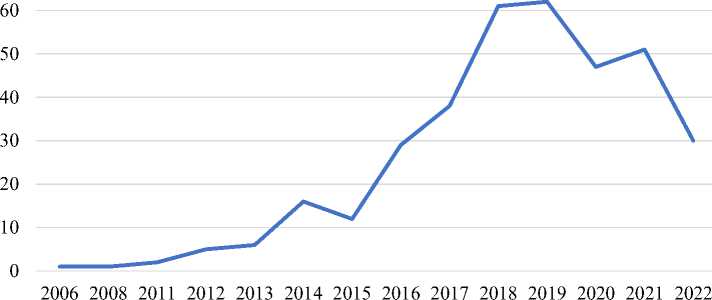
Note . 2022 shows data until the 10th of November 2022.
Source . Authors’ calculations. Data from Scopus.
Fig. 1. Publications per year
Figure 1 shows that while research output on regional entrepreneurship has increased since 2006, it has not always maintained a year-on-year increase. For examples, research output declined in the years 2015 and 2020. We believe the lower productivity for the year 2020 could be due to the COVID-19 pandemic. There was also a decline in 2022.
Most productive universities. A frequently analysed metric in bibliometric studies is to analyse the most productive research institutions on a given topic. For our research, we analysed the Russian academic institutions with the most articles on regional entrepreneurship in Russia. Table 1 shows our results for this.
T a b l e 1. Productive research organisations
|
Institutions |
Number of articles |
|
Russian Academy of Sciences |
27 |
|
HSE University |
24 |
|
Plekhanov Russian University of Economics |
21 |
|
Ural Federal University |
20 |
|
Russian Presidential Academy of National Economy and Public Administration (RANEPA) |
20 |
|
Kazan Federal University |
18 |
|
Financial University under the Government of the Russian Federation |
14 |
|
Lomonosov Moscow State University |
12 |
|
Institute of Economics of the Urals Branch of the Russian Academy of Sciences |
12 |
Source . Authors’ calculations. Data from Scopus.
Table 1 shows the results for the most productive research organisations. To calculate this, only research institutions with at least 12 articles on entrepreneurship in regions (n ≥ 12) were included. The results show that the Russian Academy of
RUSSIAN JOURNAL OF REGIONAL STUDIES. Vol. 31, no. 3. 2023 ^^ Sciences (RAN) is the leading institution in the research field (n = 27), while the Higher School of Economics is a close second (n = 24).
Leading authors. To calculate the leading authors, we analysed the authors with the greatest number of published researches on regional entrepreneurship in Russia. Other methods of analysis can include analysing the number of citations, or the Hirsch index ( h -index) of the authors on the specific topic. The results of calculations: S. Zemtsov – 10 publications, V. A. Barinova – 7, R. I. Malikov – 6, R. A. Abramov – 5, M. S. Sokolov – 5, N. Z. Solodilova – 5.
For the leading authors, we included only authors with 5 or more articles in our calculations (n ≥ 5). Productive authors include Zemtsov of RANEPA (n = 10), Barinova also of RANEPA (n =10) and Malikov of Ufa State Petroleum Technological University (n = 6).
Leading journals and publications. To calculate the leading journals on regional entrepreneurship in Russia, we analysed journals and other types of publications with the highest number of published articles on the topic. Only journals/publica-tions with at least 5 articles were included in the results (n ≥ 5) which are shown in Table 3 below.
The results show (Table 2) that Economy of Region is the most active journal on regional entrepreneurship in Russia with 26 publications beginning in 2011. The IOP Conference Series is next with 24 publications. However, unlike Economy of Region which has been publishing on the topic for more than twelve years, studies in the IOP Conference Series have been published in the recent years. The high concentration of studies in the last five years means that the IOP Conference Series is presently the favourite method of publication for scholars of regional entrepreneurship. Other publications include the Springer book series, Lecture Notes in Networks and Systems (n = 17), and the E3S Web of Conferences (n = 10).
T a b l e 2. Leading journals and publications
|
Journal / Publication |
Number of articles |
Published years |
|
1 |
2 |
3 |
|
Academy of Entrepreneurship Journal |
9 |
2018, 2019, 2020 |
|
ACM International Conference |
5 |
2020, 2021 |
|
Proceeding Series Advances in Intelligent Systems and |
6 |
2018, 2020, 2021 |
|
Computing Bylye Gody |
6 |
2016, 2017, 2018, 2019, 2021 |
|
Contributions to Economics |
6 |
2017, 2019, 2020 |
|
E3S Web of Conferences |
10 |
2019, 2020, 2021 |
|
Economy of Region |
26 |
2011, 2012, 2013, 2014, 2015, 2016, 2017, 2018, 2019, 2020, 2022 |
|
Espacios |
5 |
2017, 2018, 2019 |
|
European Research Studies Journal |
6 |
2016, 2018 |
|
International Journal of Supply Chain Management |
5 |
2018, 2019, 2020 |
|
IOP Conference Series |
24 |
2018, 2019, 2020, 2021, 2022 |
|
Journal of Advanced Research in Law and Economics |
5 |
2015, 2017, 2019, 2020 |

End of table 2
|
1 ZE |
2 |
3 |
|
Lecture Notes in Networks and Systems |
17 |
2020, 2021, 2022 |
|
Mediterranean Journal of Social Sciences |
6 |
2014, 2015 |
|
Proceedings of the International Business Information Management Association Conference |
7 |
2017, 2018, 2019 |
|
Regional Research of Russia |
5 |
2017, 2018, 2019, 2021, 2022 |
|
Sotsiologicheskie Issledovaniya |
8 |
2016, 2017, 2019, 2020 |
|
Voprosy Ekonomiki |
5 |
2006, 2008, 2014, 2016, 2018 |
|
Zhournal Novoi Ekonomicheskoi Associacii /Journal of the New Economic Association |
5 |
2018, 2020, 2022 |
|
Zhurnal Issledovanii Sotsial'noi Politiki |
5 |
2017, 2021 |
Note. Publications include journals, book series and conference proceedings. Source. Authors’ calculations. Data from Scopus.
Scientific mapping. Co-word analysis. Co-word analysis is a leading method of bibliometric analysis that examines the keywords of articles analyses the content of publications by examining author keywords. For this analysis, the primary assumption is that keywords that appear together are often related to each other [17]. Co-word analyses are useful for visually examining the evolution and trends of a research topic, and the thematic clusters within it [5; 26]. To analyse the co-words, we included author keywords occurring a minimum of 4 times (n ≥ 4). Of the 1251 total keywords in the dataset, only 62 keywords met this limit (n = 62). The results are shown in Figure 2 below.
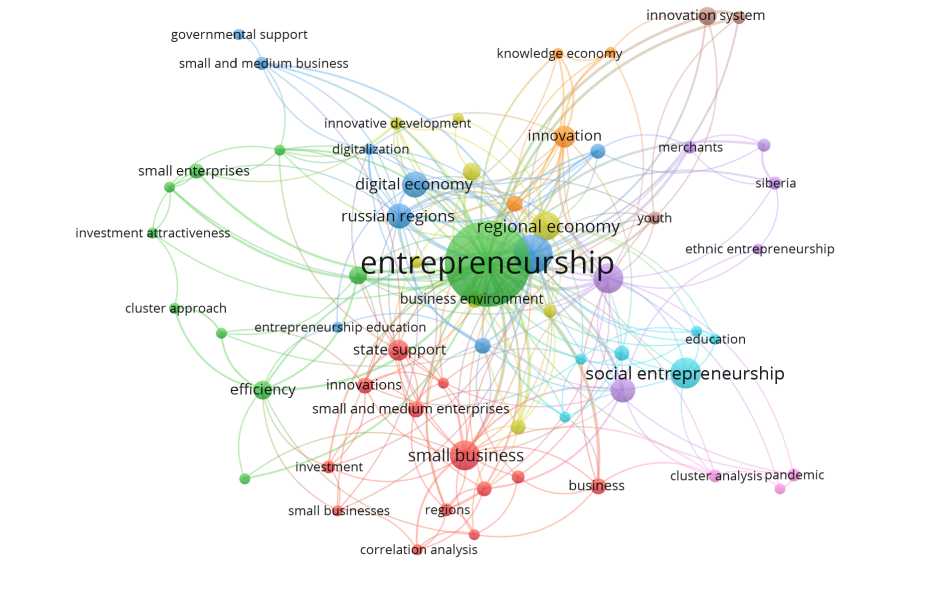
Source. Author’s elaboration using VOSviewer. Data from Scopus.
F i g. 2. Co-word analysis
Figure 2 shows that the leading thematic clusters include the entrepreneurship, small business, social entrepreneurship, digital economy, innovation, state support, and efficiency, among others.
In addition, we performed an overlay analysis of the co-word analysis. This type of analysis adds a time period to the thematic analysis and is therefore useful for analysing the emerging trends and themes on a topic [19; 25]. The results are shown in Figure 3 below.
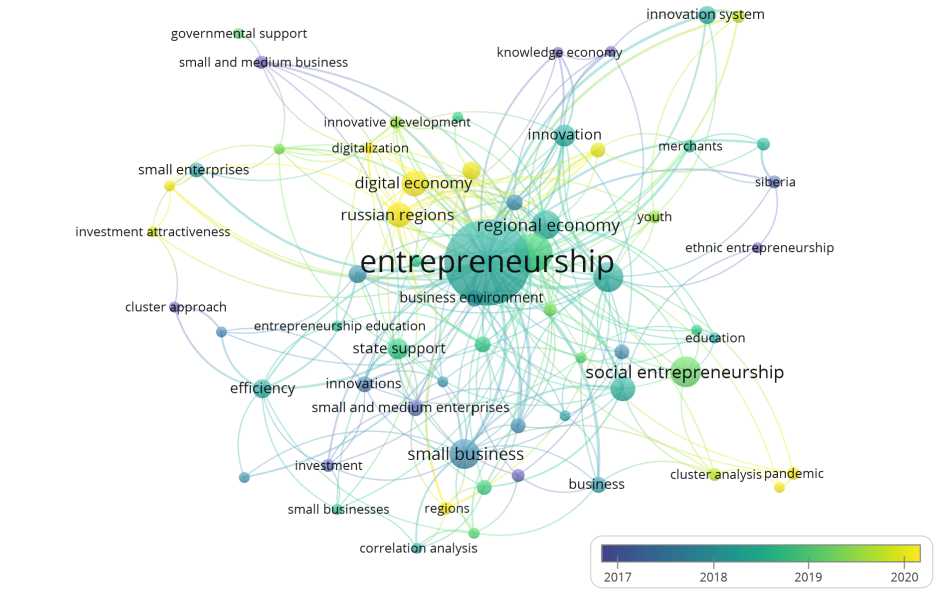
Source. Author’s elaboration using VOSviewer. Data from Scopus.
F i g. 3. Overlay analysis of co-word
Figure 3 shows that the trending/emerging themes include modernisation, pandemic, digital economy, investment attractiveness, digitalisation, cluster analysis, and higher education, among others. Furthermore, although themes like small business, investment analysis and cluster approach or analysis have remained constant, other themes such as regional innovative system, knowledge economy, agriculture, and food security have dwindled in recent years.
Co-citation analysis. Analysis of co-citation examines the references of studies within a research area to find analysis is to find similar themes [17; 27]. Co-citation presumes that two articles are similar in content if they are cited frequently together. To be included in our co-citation analysis, studies must be co-cited a minimum of 3 times (n ≥ 3). Twenty-one studies met this threshold (n = 21).
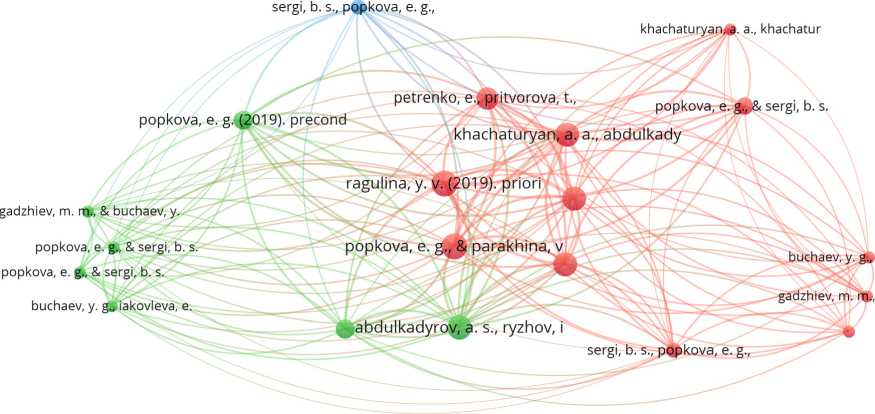
Source. Author’s elaboration using VOSviewer. Data from Scopus.
Fig. 4. Co-citation
Discussion and Conclusion. Our results revealed that studies on regional entrepreneurship in Russia first appeared on Scopus in 2006 [32]. Since then, the academic field has grown exponentially to become one of the most vibrant areas of entrepreneurial research in Russia. Following international standards of bibliometric analysis [17; 33], this study contained a performance analysis providing a scoping review of the field, and scientific mapping, analysing the content, links and patterns in the field. The results of the performance analysis show the most productive academic institutions to be the Russian Academy of Sciences and Higher School of Economics (Table 1). Also, an analysis of the leading authors shows S. Zemtsov was the most productive, while an analysis of the leading journals shows the Economy of Region published the greatest number of articles on the topic (Table 2). Furthermore, results from the scientific mapping showed the most dominant thematic clusters include entrepreneurship, government support, knowledge economy, and correlation analysis, among others (Figure 2). The emerging and trending themes include investment attractiveness, digitalisation, pandemic, and others (Figure 3). While the growth and diversity of regional entrepreneurship research was evident in our analysis, we discovered a number of important gaps and propose them as future research directions.
Studies on entrepreneurship have discovered the presence of a lag structure from when a new business is created to when it produces direct and indirect economic benefits for the region [1; 2; 34]. However, very few studies in Russia have looked into this. Also, there are a number of gaps in the sociological aspect of regional entrepreneurial research. First, there has been a rising interest in social media entrepreneurship around the world, and studies have established a connection between social media usage and small business performance [35–37]. However, even though social media entrepreneurship is popular in Russia, academic research on it remains very limited. In addition, we found a significant gap in studies on the socio-economic behaviour of entrepreneurs in Russia. Whereas international entrepreneurial studies have long established the distinct behaviour and personalities of
RUSSIAN JOURNAL OF REGIONAL STUDIES. Vol. 31, no. 3. 2023 ^^ entrepreneurs [38; 39], very few studies have looked into this in Russia. For example, studies have shown differences in the risk tolerance, need for achievement and locus of control between entrepreneurs and non-entrepreneurs [38; 39]. Similarly, we found some research gaps on entrepreneurial motivation in Russia. Prior studies have discovered a difference between necessity entrepreneurs, those pushed into entrepreneurship by negative circumstances, and opportunity entrepreneurs, those who go into entrepreneurship as a choice [40–42]. Nevertheless, in Russia, studies on this phenomenon are few. While these research gaps are by no means exhaustive, future studies should consider them.
This paper provides a synthesis of studies on regional entrepreneurship in Russia. We used a bibliometric system of analysis to quantitatively review the development of the field. Our analysis was composed of a performance review which included an investigation of the most productive authors and research organisations. Furthermore, we used a scientific mapping system to analyse the leading and trending themes within regional entrepreneurship research. To keep a quality threshold for the study, this research only includes studies from the Scopus citation database. Therefore, a limitation of this research is that it does not include studies in other bibliometric sources such as the Web of Sciences, eLibrary.ru and Google Scholar. The results should be carefully interpreted to reflect this.
Список литературы A review of academic research on regional entrepreneurship: a bibliometric analysis
- Fritsch M., Mueller P. Effects of New Business Formation on Regional Development over Time. Regional Studies. 2004;38(8):961-975. https://doi.org/10.1080/0034340042000280965
- Fritsch M., Mueller P. The Evolution of Regional Entrepreneurship and Growth Regimes. In: Fritsch M., Schmude J., editors. Entrepreneurship in the Region. Boston, MA: Springer US; 2006. p. 225-244. https://doi.org/10.1007/0-387-28376-5_11
- Van Stel A., Storey D.J. The Link between Firm Births and Job Creation: Is there a Upas Tree Effect? Regional Studies. 2004;38(8):893-909. https://doi.org/10.1080/0034340042000280929
- Stel A. The Link between Firm Births and Job Creation. In: Stel A. Empirical Analysis of Entrepreneurship and Economic Growth. Boston, MA: Springer US; 2006. p. 113-144. https://doi. org/10.1007/0-387-29419-8_6
- Linnenluecke M.K., Marrone M., Singh A.K. Conducting Systematic Literature Reviews and Bibliometric Analyses. Australian Journal of Management. 2020;45(2):175-194. https://doi. org/10.1177/0312896219877678
- Vlasov M., Polbitsyn S.N., Olumekor M., Oke A. The Influence of Socio-Cultural Factors on Knowledge-Based Innovation and the Digital Economy. Journal of Open Innovation: Technology, Market, and Complexity. 2022;8(4):194. https://doi.org/10.3390/joitmc8040194
- Fritsch M., Wyrwich M. The Effect of Entrepreneurship on Economic Development - an Empirical Analysis Using Regional Entrepreneurship Culture. Journal of Economic Geography. 2017;17(1): 157-189. https://doi.org/10.1093/jeg/lbv049
- Cumming D., Johan S. The Differential Impact of the Internet on Spurring Regional Entrepreneurship. Entrepreneurship Theory and Practice. 2010;34(5):857-884. https://doi.org/10.1111/ j.1540-6520.2009.00348.x
- Olumekor M., Polbitsyn S.N. A Review of the Development of Electronic Commerce in Russia and Its Implications for Small Businesses. Bulletin of the South Ural State University. Ser. Economics and Management. 2022;16(1):143-148. https://doi.org/10.14529/em220114
- Olumekor M., Haddad H., Al-Ramahi N.M. The Relationship between Search Engines and Entrepreneurship Development: A Granger-VECM Approach. Sustainability. 2023;15(6):5053. https:// doi.org/10.3390/su15065053
- Sá E., Casais B., Silva J. Local Development through Rural Entrepreneurship, from the Triple Helix Perspective: The Case of a Peripheral Region in Northern Portugal. International Journal of Entrepreneurial Behavior & Research. 201S;25(4):69S-716. https://doi.org/10.110S/ IJEBR-03-201S-0172
- Roundy P.T., Fayard D. Dynamic Capabilities and Entrepreneurial Ecosystems: The Micro-Foundations of Regional Entrepreneurship. The Journal of Entrepreneurship. 2019;2S(1):94-120. https:// doi.org/10.1177/097135571SS10296
- Olumekor M., Stojic A., Kehler T., Polo F. The Impact of COVID-19 on the Quality of Life and Happiness of Care Home Residents in Croatia: A Cross-Sectional Study. Behavioral Sciences. 2022;12(11):463. https://doi.org/10.3390/bs12110463
- Mikhaylova A.V., Popova L.N. Digital Economy and the Development of Women's Entrepreneurship: A Regional Aspect. In: Ashmarina S.I., Mantulenko V.V., editors. Digital Economy and the New Labor Market: Jobs, Competences and Innovative HR Technologies. Cham: Springer International Publishing; 2021. p. 329-335. https://doi.org/10.1007/97S-3-030-60926-9_42
- Mantaeva E.I., Goldenova V.S., Slobodchikova I.V., Avadaeva I.V. The Role of Technological Entrepreneurship in the System of Regional Economy: Problems and Perspectives of Development. In: Popkova E.G., Sergi B.S., editors. "Smart Technologies" for Society, State and Economy. Cham: Springer International Publishing; 2021. p. 1406-1412. https://doi.org/10.1007/97S-3-030-59126-7_154
- Zemtsov S., Chepurenko A., Mikhailov A. Pandemic Challenges for the Technological Startups in the Russian Regions. Foresight andSTI Governance. 2021;15(4):61-77. https://doi.org/10.17323/2500-2597.2021.4.61.77
- Donthu N., Kumar S., Mukherjee D., Pandey N., Lim W.M. How to Conduct a Bibliometric Analysis: An Overview and Guidelines. Journal of Business Research. 2021;133:2S5-296. https://doi. org/10.1016/j.jbusres.2021.04.070
- 1S. Zupic I., Cater T. Bibliometric Methods in Management and Organization. Organizational Research Methods. 2015;1S(3):429-472. https://doi.org/10.1177/109442S114562629
- Olumekor M. Public Sector Entrepreneurship: Scientific Mapping and Research Agenda. Organizacija. 2022;55(4):259-271. https://doi.org/10.247S/orga-2022-0017
- Vallaster C., Kraus S., Merigó Lindahl J.M., Nielsen A. Ethics and Entrepreneurship: A Bibliometric Study and Literature Review. Journal of Business Research. 2019;99:226-237. https://doi. org/10.1016/j.jbusres.2019.02.050
- Rey-Martí A., Ribeiro-Soriano D., Palacios-Marqués D. A Bibliometric Analysis of Social Entrepreneurship. Journal of Business Research. 2016;69(5):1651-1655. https://doi.org/10.1016/j. jbusres.2015.10.033
- Block J., Fisch C., Rehan F. Religion and Entrepreneurship: A Map of the Field and a Bibliometric Analysis. Management Review Quarterly. 2020;70(4):591-627. https://doi.org/10.1007/s11301-019-00177-2
- Pato M.L., Teixeira A.A.C. Twenty Years of Rural Entrepreneurship: A Bibliometric Survey. Sociología Ruralis. 2016;56(1):3-2S. https://doi.org/10.1111/soru.1205S
- Xu Z., Wang X., Wang X., Skare M. A Comprehensive Bibliometric Analysis of Entrepreneurship and Crisis Literature Published from 19S4 to 2020. Journal of Business Research. 2021;135:304-31S. https://doi.org/10.1016/jjbusres.2021.06.051
- van Eck N.J., Waltman L. Software Survey: VOSviewer, a Computer Program for Bibliometric Mapping. Scientometrics. 2010:S4(2):523-53S. https://doi.org/10.1007/s11192-009-0146-3
- Tal D., Gordon A. Women as Political Leaders: A Bibliometric Analysis of the Literature. Society. 201S;55(3):256-261. https://doi.org/10.1007/s12115-01S-024S-S
- Sweileh W.M. A Bibliometric Analysis of Health-Related Literature on Natural Disasters from 1900 to 2017. Health Research Policy and Systems. 2019;17(11):1S. https://doi.org/10.11S6/s12961-019-0418-1
- Ragulina Y.V. Priorities of Development of Industry 4.0 in Modern Economic Systems with Different Progress in Formation of Knowledge Economy. In: Popkova E.G., Ragulina Y.V., Bogoviz A.V., editors. Industry 4.0: Industrial Revolution of the 21st Century. Cham: Springer International Publishing; 2019. Vol. 169. p. 167-174. https://doi.org/10.1007/97S-3-319-94310-7_16
- Popkova E.G., Parakhina V.N. Managing the Global Financial System on the Basis of Artificial Intelligence: Possibilities and Limitations. In: Popkova E.G., editor. The Future of the Global Financial System: Downfall or Harmony. Cham: Springer International Publishing; 2019. Vol. 57. p. 939-946. https://doi. org/10.1007/97S-3-030-00102-5_100
- Abdulkadyrov A.S., Ryzhov I.V., Strokov A.I., Kamzolov Yu.V. Current Aspects of Improving the Organization of Production of High-Tech Products. Proceedings of Higher Educational Institutions. Textile Industry Technology. 2017;371:18-27. Available at: https://ttp.ivgpu.com/wp-content/ uploads/2018/04/371_4.pdf (accessed 14.03.2023). (In Russ., abstract in Eng.)
- Popkova E.G., Egorova E.N., Popova E., Pozdnyakova U.A. The Model of State Management of Economy on the Basis of the Internet of Things. In: Popkova E.G., editor. Ubiquitous Computing and the Internet of Things: Prerequisites for the Development of ICT. Cham: Springer International Publishing; 2019. Vol. 826. Pp. 1137-1144. https://doi.org/10.1007/978-3-030-13397-9_116
- Matsnev O. Venture Entrepreneurship: International Experience and Russian Practice. Problems of Economic Transition. 2006;49(8):33-43. https://doi.org/10.2753/PET1061-1991490802
- Olumekor M.O. A Comparative Study of Higher Educational Institutions in Russia and England: Analyzing the Fulfilment Levels of Students. In: Bogoviz A.V., Ragulina J.V., editors. Industry Competitiveness: Digitalization, Management, and Integration. Cham: Springer International Publishing; 2021. Vol. 280. p. 1011-1019. https://doi.org/10.1007/978-3-030-80485-5_113
- Baptista R., Escária V., Madruga P. Entrepreneurship, Regional Development and Job Creation: The Case of Portugal. Small Business Economics. 2008;30(1):49-58. https://doi.org/10.1007/s11187-007-9055-0
- Mei M.Q., Genet C. Social Media Entrepreneurship: A Study on Follower Response to Social Media Monetization. European Management Journal. 2022. https://doi.org/10.1016/j. emj.2022.04.006
- Johnson N.E., Short J.C., Chandler J.A., Jordan S.L. Introducing the Contentpreneur: Making the Case for Research on Content Creation-Based Online Platforms. Journal of Business Venturing Insights. 2022;18:e00328. https://doi.org/10.1016/jjbvi.2022.e00328
- Gustafsson V., Khan M.S. Monetising Blogs: Enterprising Behaviour, Co-creation of Opportunities and Social Media Entrepreneurship. Journal of Business Venturing Insights. 2017;7:26-31. https:// doi.org/10.1016/j.jbvi.2017.01.002
- Kerr S.P., Kerr W.R., Xu T. Personality Traits of Entrepreneurs: A Review of Recent Literature. Foundations and Trends in Entrepreneurship. 2018;14(3):279-356. http://doi.org/10.1561/0300000080
- Collins C.J., Hanges P. J., Locke E.A. The Relationship of Achievement Motivation to Entrepreneurial Behavior: A Meta-Analysis. Human Performance. 2004;17(1):95-117. https://doi.org/10.1207/ S15327043HUP1701_5
- Acs Z. How is Entrepreneurship Good for Economic Growth? In: Acs Z. Entrepreneurship, Growth and Public Policy. Edward Elgar Publishing; 2008. p. 291-301. https://doi. org/10.4337/9781035305421.00030
- Fairlie R.W., Fossen F.M. Opportunity Versus Necessity Entrepreneurship: Two Components of Business Creation. CESifo Working Paper Series No. 6854. 2018. https://doi.org/10.2139/ssrn.3140340
- Block J.H., Wagner M. Necessity and Opportunity Entrepreneurs in Germany: Characteristics and Earning s Differentials. Schmalenbach Business Review. 2010;62(2):154-174. https://doi.org/10.1007/ BF03396803

